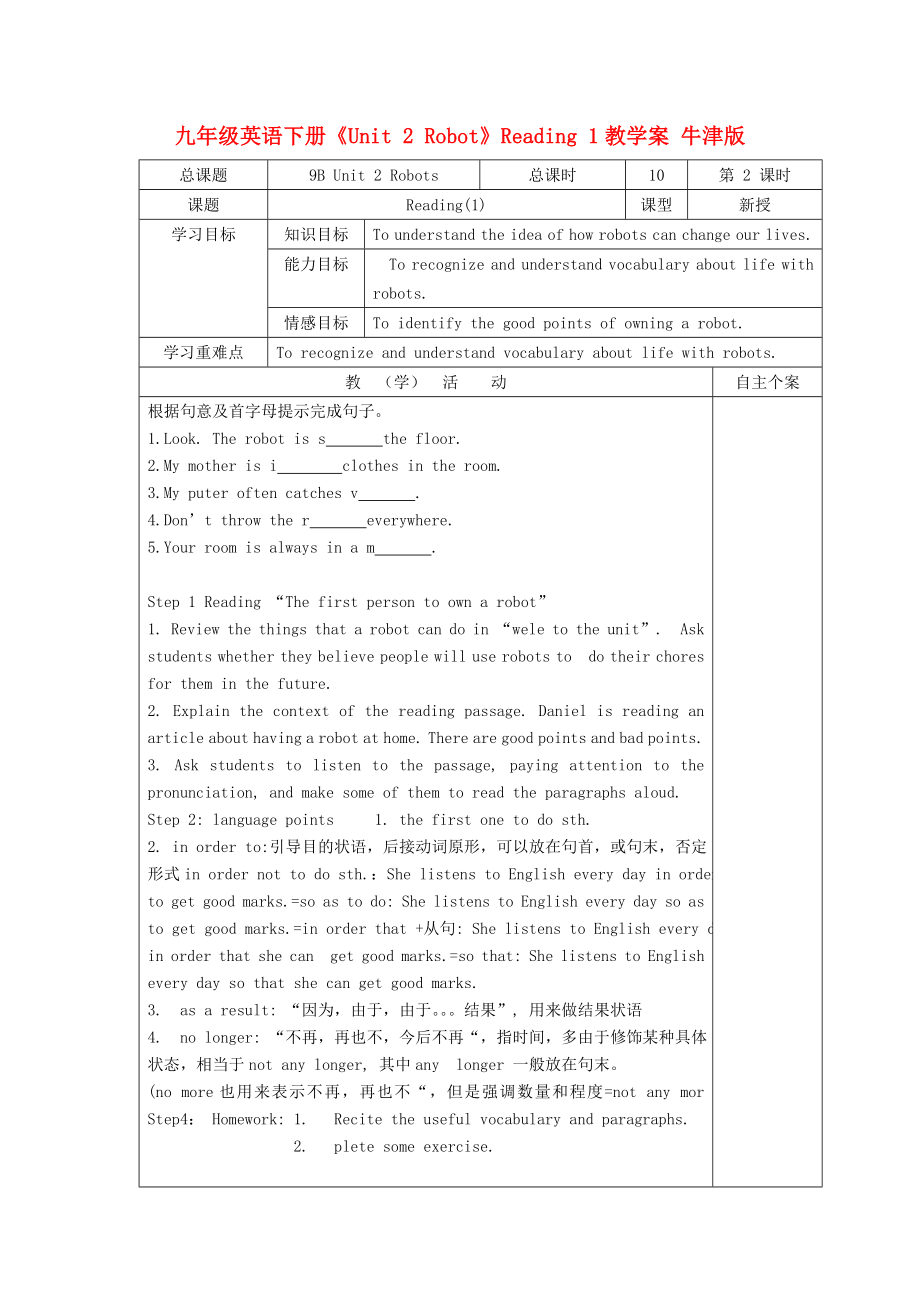《九年級(jí)英語下冊(cè)《Unit 2 Robot》Reading 1教學(xué)案 牛津版》由會(huì)員分享����,可在線閱讀,更多相關(guān)《九年級(jí)英語下冊(cè)《Unit 2 Robot》Reading 1教學(xué)案 牛津版(2頁珍藏版)》請(qǐng)?jiān)谘b配圖網(wǎng)上搜索����。
1、九年級(jí)英語下冊(cè)《Unit 2 Robot》Reading 1教學(xué)案 牛津版
總課題
9B Unit 2 Robots
總課時(shí)
10
第 2 課時(shí)
課題
Reading(1)
課型
新授
學(xué)習(xí)目標(biāo)
知識(shí)目標(biāo)
To understand the idea of how robots can change our lives.
能力目標(biāo)
?To recognize and understand vocabulary about life with robots.
情感目標(biāo)
To identify the good points of owning a robot.
2�����、學(xué)習(xí)重難點(diǎn)
To recognize and understand vocabulary about life with robots.
教 (學(xué)) 活 動(dòng)
自主個(gè)案
根據(jù)句意及首字母提示完成句子��。
1.Look. The robot is s the floor.
2.My mother is i clothes in the room.
3.My puter often catches v .
4.Don’t throw the r everywhere.
5.Your room is always in a m
3����、 .
Step 1 Reading “The first person to own a robot”
1. Review the things that a robot can do in “wele to the unit”. Ask students whether they believe people will use robots to do their chores for them in the future.
2. Explain the context of the reading passage. Daniel is reading an art
4、icle about having a robot at home. There are good points and bad points.
3. Ask students to listen to the passage, paying attention to the pronunciation, and make some of them to read the paragraphs aloud.
Step 2: language points 1. the first one to do sth.
2. in order to:引導(dǎo)目的狀語
5�、,后接動(dòng)詞原形,可以放在句首�����,或句末�,否定形式in order not to do sth.:She listens to English every day in order to get good marks.=so as to do: She listens to English every day so as to get good marks.=in order that +從句: She listens to English every day in order that she can get good marks.=so that: She listens to Englis
6、h every day so that she can get good marks.
3. as a result: “因?yàn)?,由于�����,由于�。。��。結(jié)果”, 用來做結(jié)果狀語
4. no longer: “不再�����,再也不��,今后不再“�����,指時(shí)間,多由于修飾某種具體狀態(tài)���,相當(dāng)于not any longer, 其中any longer 一般放在句末�����。
(no more也用來表示不再���,再也不“,但是強(qiáng)調(diào)數(shù)量和程度=not any mor Step4: Homework: 1. Recite the useful vocabulary and paragraphs.
7��、 2. plete some exercise.
完成下列句子��。
1.他是本鎮(zhèn)第一個(gè)擁有機(jī)器人的人�。
He is the a robot.
2.他總是很忙,幾乎沒有時(shí)間來做他的愛好����。
He is busy and has his .
3.機(jī)器人使得我們的生活容易多了。
Robots make our life .
4.結(jié)果是�,我不需要再起早來做家務(wù),并且我可以在床上多呆一個(gè)小時(shí)了��。
8�����、 ,I need to get up early
and I can stay in bed .
5.一頓美味的晚飯將會(huì)替他準(zhǔn)備好在桌上。
dinner would him on the table.
6.機(jī)器人將會(huì)在房子里走來走去并且把東西撞翻����。
The robot would the house and
9、 .
1. Jack is a good friend _____, he often es to our home for a visit.
A. of my father B. of my father's C. for my father D. with my father
2. What way are you thinking of _____ rid of the flies?
A. to get B. getting C. being got D. to be getting
3. We must
10���、do something to _____ factories _____waste water into the river before it is cleaned.
A. stop; pouring . B. prevent; to pour C. keep; pouring D. stop; to pour
4. "_____ of them are not here." means "_____ of them are not here."
A. All; Some B. Both; Every C. Both; Neither D. All;
11��、 Both
1.People moved to another place because of the river.
A. pollute B. polluting C. polluted D. polluting
2. China is a country, but America is a country.
A. develop, developed B. developed, developing
C. developing, developed D. development, developed
3. The population of our city is being .
A. larger and larger B. more and more
C. fewer and fewer D. less and less
教/學(xué)后記(我的問題,體悟����,收獲)
 九年級(jí)英語下冊(cè)《Unit 2 Robot》Reading 1教學(xué)案 牛津版
九年級(jí)英語下冊(cè)《Unit 2 Robot》Reading 1教學(xué)案 牛津版

